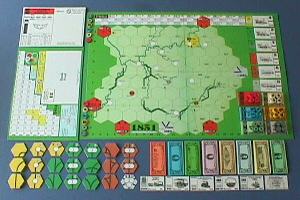 |
| Fiddle of Gold |
Now I will speak honestly, here – Fiddle of Gold started as a thought experiment. How could one take the best parts of a economic stock trading game, (most notably the 18xx series of train games), and convert that gameplay into something more pure, more based around the economic politics and the intrigue with less energy invested into this economy that our companies are all in the business of.
For those unfamiliar with this variety
of game, I will give a brief introduction. In an 18xx game, you
invest in Train Companies, specific ones. With largest investment in
a company, you gain control of it and make decisions using the money
that everyone has invested into the company. These decisions can be
good for the company (expanding the lines and so on), or bad for the
company (paying out dividends to stock holders rather than trying to
run a business), but generally they run somewhere in-between. The
goal here is to make the most money out of these companies that many
people might have a stake in. A company will likely be good if it has
many investors, because they are giving it the money to be good, and
have likely invested because it seems like a safe bet. A company will
also usually try to be good if it only has one investor, because they
will be making all of the profit. In this way there are many shades
of 'alliance' you could describe happening and these leads to some
very interesting gameplay. The specific nature of any of these
systems can vary quite a bit depending upon the game, but this is a
sort of general outline (and why we care).
 |
| An 18xx Game Courtesy of their Wiki |
So in taking these train games, S first
started with some sort of Fairy game concept that was always a bit
unclear to me. The core economy of it never seemed to work out, but
it did make clear that a natural extension of this sort of concept
was a sort of 'Demon Deal', as companies you invested in were often
screwed over by you and still had to obey. This meant the whole
concept made an easy transition into a sort of supernatural demons
owning you sort of theme, which would sow the seeds for later ideas.
To make the economy work out I had a
few proto-games sort of drafted.
The truly first version was a bit of a
mess, and focused upon city-building. The economy how how a city
developed and so on seemed to be sufficiently interesting and simpler
than building train networks. At its core though it didn't
necessarily hook into the competition aspects well enough that drive
the genre forward and was a bit of a flop of an idea.
This quickly transitioned into a sort
of warring nations game, where leaders of the nations would be
tempted by players (demons), much like the game Imperial. Country
based mechanics could be slimmed down, leading to some pretty basic
area-control mechanics. Area control felt like a natural extension of
a 'simple' competing companies economy, as the easiest way to change
an economy in competition was to just take or lose territory that
gave points.
The final idea I came up with was a
sort of competitive music game. As a simple thought experiment for
how to make the simplest possible theme based off the territory
expansion of war, I decided that musicians fighting each-other for
popularity seemed decent. Now, in my head this idea seemed silly, as
I pretty much exclusively imagined pop musicians competing against
each-other, all of which were bad at music and basically pawns. The
theme, in my eyes, just didn't make much sense, as I had only been
trying to take the very minimal excuses that would technically work,
to succeed at the initial design goal -have the lightest possible
economic game for competing 'companies' that you can hold shares in.
S was wise enough (or at least
distanced enough from my thoughts), to see that this theme was
actually spot on if you tapped into broader conventions that already
existed in the whole of music. I created a simple Territory map, and
a simple ruleset for expansion, and the very first stages of Fiddle
of Gold were born.
 |
| The Original Map prototype had more zones, and expected to have 3 time periods, but this made the game take too long. |

/pic1803395.jpg)
